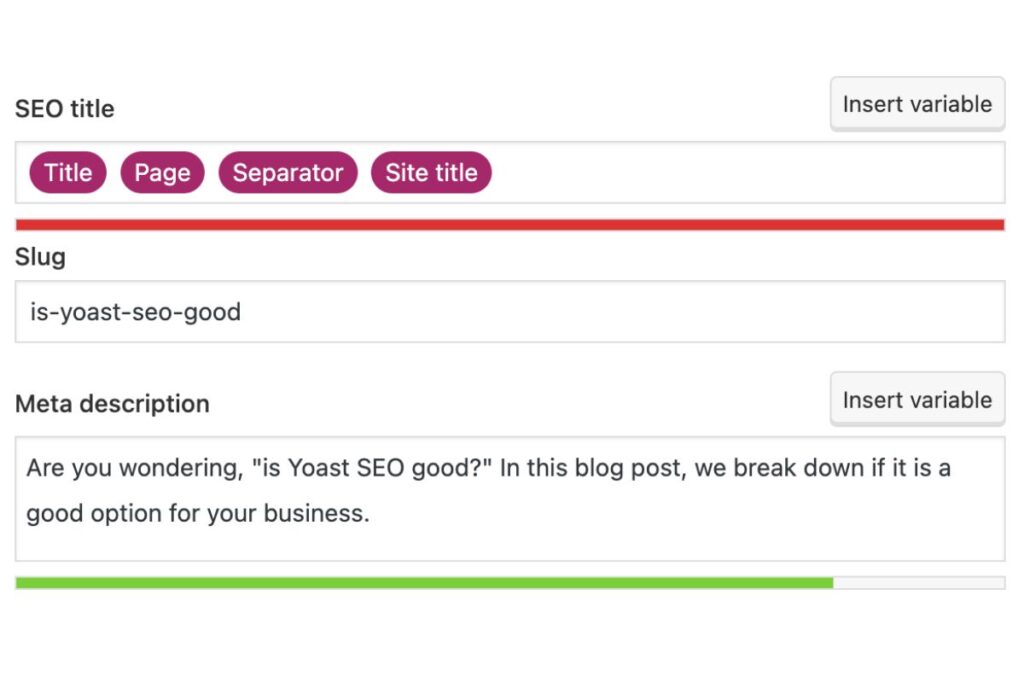Are you wondering, “is Yoast SEO good?” I’m here to help!
Yoast SEO can help you get noticed and build your brand. Yoast is the most popular SEO plugin for WordPress websites. It’s a powerful tool that helps you optimize your content and boost your ranking on search engines.
However, I’ve been blogging for 10+ years and have a bit of a shocker for you… you really shouldn’t trust everything that Yoast tells you! There are some things that we do use Yoast for, but also some things that we don’t. We will be breaking it down in this post.
What is Yoast SEO? What is the “green light?”
In case you don’t know what Yoast is, it is an SEO plugin that is available pretty much on all WordPress sites. Most people on WordPress will probably have Yoast or Rank Math. They’re essentially the same thing.
But it’s a plugin where you can type in your keyword and it’ll basically tell you if your post is optimized for it or not. And so many people are like, “Oh, once I get the green light on Yoast, that means that my blog post or my website page is 100% optimized, and now I’m going to be ranking on Google,” which is not the case.

Why We Don’t Rely on Yoast for SEO
Sometimes it gives the wrong information
All right, so the first reason why we don’t rely on Yoast is that sometimes it gives you the absolute wrong information. So this doesn’t happen all the time, but we have seen it happen more often in our travel blog, Volumes & Voyages.
Yoast will tell you how many times the keywords are in the article and make sure that you have it in your post enough. Sometimes, it will tell you random numbers, like that it has detected the keyword in your post 57 times or something crazy like that.
Then, you might actually check your post and find that you only have it in there about 5. So… sometimes it is not always super accurate. So, if you go solely based on that, it can end up getting super confusing, and then you have to go through and actually figure out how many times it is in there.

Yoast will make you over-optimize
Oftentimes, Yoast is going to make you overoptimize. So generally, we recommend having your primary keyword about every 500-ish words or so. Often if you even put it in the different headers throughout the post, you don’t even need it as often because you’re giving it a lot more power by making it a header instead.
But it’s going to make you overoptimize a lot of times. So if we write a 1500-word article, sometimes Yoast will be like, “You’ve had the keyword in there already four times, but we recommend you have it in there ten times,” which is way too much.
If you overoptimize, Google is going to be able to look through exactly what you’re doing and might rank you lower because of it.
Sometimes Yoast will give you a green light when you barely do anything
Sometimes Yoast is going to give you the green light when you’ve done barely anything.
So, for example, going back to that keyword thing we just mentioned, sometimes when you just type in the keyword into Yoast, and you put it in there as many times as it tells you to, it’ll automatically just give you the green light, even though you haven’t done anything else that you should do to make sure your blog post ranks.
Like maybe you didn’t write a great blog post title. Maybe your keyword is not even in the blog post title. Maybe you don’t even have the keyword in your slug, or maybe you didn’t even write a meta description. Maybe you don’t have links between your posts throughout it.
There are so many things that go into making a blog post rank besides just having the keywords even though the keywords are the most important thing.

Yoast will not tell you if your keyword is good
Yoast is also only going to tell you if you’ve optimized your posts based on the keyword that you put in.
So you can write an entire post, and put the keyword into Yoast that you included throughout your post. It might tell you that you have a green light, but that keyword might not be one that you can rank for. It might be one that no one’s searching for.
There’s a ton of stuff that goes into actually finding the correct keywords. So even though the Yoast light might be green, if you put in a keyword that you’re not able to rank for or a keyword that isn’t a good keyword, it doesn’t matter if it’s green; the post probably isn’t going to rank anyway.
What do we use Yoast for, then?
FAQ Blocks
So the first one is actually FAQ blocks. We do this a lot more on our travel blog, but essentially there is an option when you’re in the WordPress editor to create FAQ blocks using Yoast. That just allows it to be read better by Google instead of using different headings and bold sections to write out your FAQs.
And by using FAQ sections in your blog posts, when someone goes on Google and is searching for anything, there’s always that little section that says people are also asking, and there’ll be little questions there.
And essentially, by using the FAQ schema from Yoast, you can potentially rank for the answer. So when someone pops open the question on Google, your little answer could be there, and it could link to your post.
Entering meta information

A couple of other things that we use Yoast for are writing or entering the meta description and the slug. The slug is going to be what shows up at the end of your URL, and the meta description is going to be what shows up when your post pulls up on Google.
You always want your slug to be the keyword that you want and not include things like numbers. So if you have a post that’s, you know, five best places to take pictures in a city, you don’t want the five in there or anything like that.
To look over suggestions
We do use it as a reference to look over and check the suggestions that it gives us, but we don’t always follow it. So, for example, with the keyword one, if it’s giving us ridiculous numbers, we’ll just ignore it.
However, it can be helpful if you look through, and it’s, you know, saying your keywords only in there twice; we’ll double-check. If it is actually only in there twice, we might add it in a couple more places.
Or if it’s saying that it’s not in the headings or the title or something like that, we’ll use it just to make sure that it is optimized as best as possible.
We won’t follow it 100%, and it’s not necessarily the end all be all of if your post is going to rank.
That little section down there does just give you a couple of suggestions, and it’s good to check over it and use your discretion on whether or not you actually want to do what it says.

Final Thoughts: Is Yoast SEO Good?
The takeaway is that Yoast SEO can save you time, make your website more user-friendly and boost your ranking in SERPs. However, it can also share a lot of misinformation, so you want to pay close attention to it.
Ultimately, the decision of whether or not to use Yoast SEO depends on the type of website you’re running and the level of optimization you need.
Check these out next:
- How Often Should I Blog for SEO?
- Romantic Website Design for A Lost Epic
- Why Your Business Needs SEO for Business Growth
- 7 Benefits of SEO for Small Business
- Is Showit good for SEO?
- How to Attract Ideal Clients Through Blogging - July 24, 2024
- How to Use Local SEO for Photographers through Educational Blog Content - July 17, 2024
- How to Repurpose Blog Content for Social Media: Case Study with Tiffany Lantz - July 15, 2024
7/29/23
Published On:
Krystianna Pietrzak




